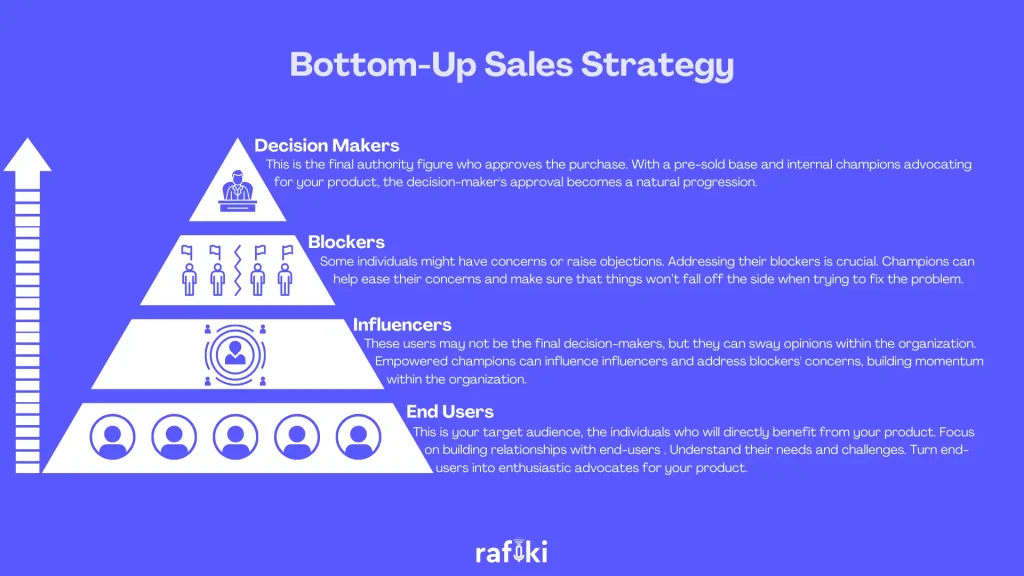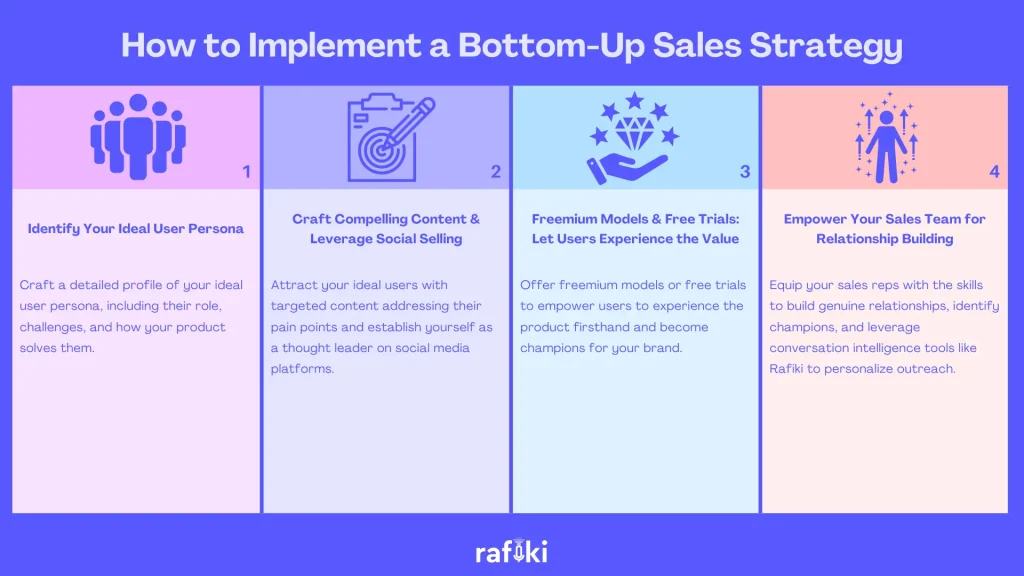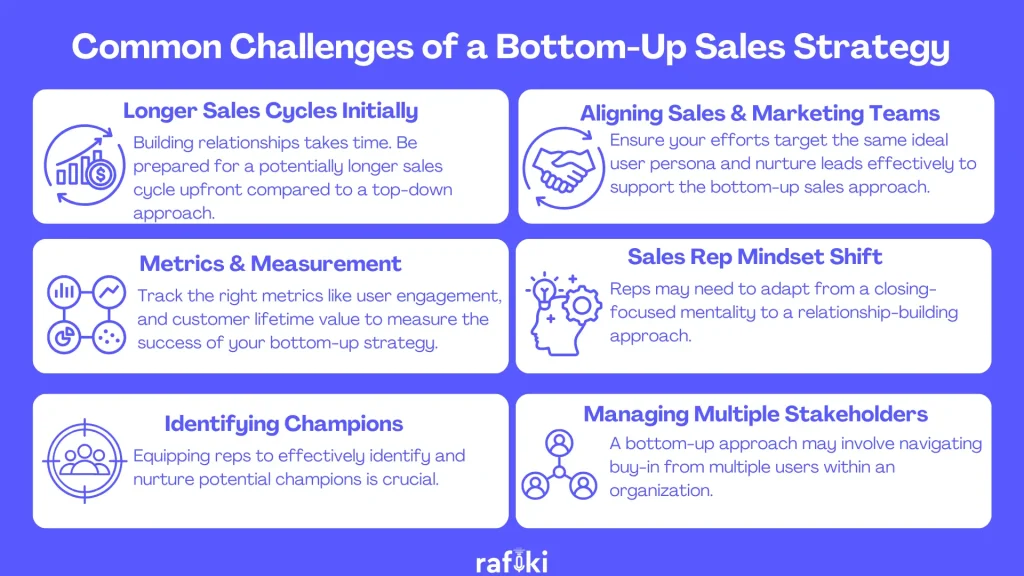Why You Should Consider a Bottom Up Sales Strategy in 2024
In today’s sales landscape, traditional top-down sales strategies, where the focus lies on landing high-level decision-makers first, are becoming increasingly ineffective. Buyers are more informed, have access to a wealth of information online, and expect a personalized approach. A bottom-up sales strategy, however, flips the script by prioritizing building relationships with individual users.
This fosters trust, creates internal champions within the organization, and ultimately leads to higher conversion rates. Let’s delve into why a bottom-up sales strategy is a must-have for your sales team in 2024, and explore actionable steps to implement it successfully.
What is a Bottom-Up Sales Strategy?
A bottom-up sales strategy starts at the ground level, focusing on building relationships with individual users who will benefit most from your product. The hypothesis here is that the end users are always stronger influencers on the decision makers than you i.e. the sales person. So you convince the end users and through their help, convince the decision makers. The end users could be the marketing team looking for a content marketing platform, a project manager seeking a new project management tool, or a customer service rep needing a communication solution. By understanding their specific needs and pain points, you can tailor your approach and demonstrate the value proposition directly to those who will influence the buying decision.
The bottom up strategy is effective when you need a multi-frontal approach, where you need a mass movement rather than just one or two decision makers converted.
Imagine a company selling a powerful new accounting software. In a bottom-up approach, the sales rep wouldn’t just target the CFO. They might start by connecting with the accounting team, understanding their daily struggles with manual data entry and time-consuming processes. By showcasing how the software automates tasks and streamlines workflows, the rep can build trust with the end-users who will ultimately champion the product internally and convince the CFO of its value.
This strategy goes beyond B2B sales. In the education sector, for instance, a company selling a new online learning platform wouldn’t just approach the school principal. They might target individual teachers, understand their challenges in engaging students, and demonstrate how the platform offers interactive learning modules and personalized feedback features. These teachers, excited about the potential to improve their classroom experience, can then advocate for the platform’s adoption within the school.

How is it Different from Top Down Sales Strategy?
A top-down sales strategy takes the opposite approach. The focus is on securing buy-in from high-level decision-makers, typically executives or C-suite leaders, who then push the product or service down the chain of command. This approach can be effective for large enterprise deals where a single decision-maker holds significant sway.
For instance, a cybersecurity company selling a comprehensive security solution might target the CIO of a large corporation. By highlighting the potential financial and reputational damage from data breaches, and showcasing the platform’s robust security features, the sales rep can convince the CIO to mandate the solution across the entire organization.
Similarly, a hospital administration system might be pitched directly to the CEO of a hospital network. Here, the focus would be on streamlining operations, improving patient care, and reducing costs – benefits that ultimately resonate with the top decision-maker.
5 Reasons to Adopt a Bottom-Up Sales Strategy in 2024
#1: Empower Your Champions
A bottom-up approach isn’t about selling to individual users; it’s about cultivating passionate advocates within the organization. Building trust and addressing their specific needs lets you create champions who genuinely believe in your product’s value. These champions will then organically promote the product to their colleagues and influence the buying decision from the inside out.
#2: Deeper Needs Understanding
Traditionally, sales reps rely on assumptions about a company’s needs based on industry trends or generic buyer personas. A bottom-up approach flips this script. By directly engaging with end-users, you gain a deeper understanding of their specific challenges and pain points. This allows you to tailor your pitch, address their unique concerns, and demonstrate a genuine interest in solving their problems.
#3: Organic Growth Through Word-of-Mouth
A satisfied user is a walking advertisement. Focusing on individual needs and exceeding expectations lets you cultivate a base of happy users who rave about your product. This organic word-of-mouth influence is powerful. When users trust the recommendations of their peers, they’re more likely to consider your product and champion its adoption within the organization.
#4: Faster Sales Cycles with Pre-Sold Champions
Imagine a scenario where you’ve already built relationships and addressed the concerns of key users within a company. When it comes time to approach the decision-maker, the sale becomes significantly easier. Those internal champions have already vouched for your product, and the value proposition is clear. This can significantly shorten sales cycles and get you to that coveted “yes” much faster.
#5: Improved Customer Retention Starts with Relationships
The foundation of any successful business is customer loyalty. A bottom-up sales strategy prioritizes building relationships with individual users from the very beginning. This fosters trust, ensures they feel heard and valued, and increases the likelihood of long-term satisfaction. When users feel like more than just a number, they’re more invested in your product’s success and less likely to churn. Fostering strong customer relationships is paramount, and a bottom-up sales strategy is a powerful tool to achieve that.
Putting Your Bottom-Up Sales Strategy into Action
Unlike a top-down approach that focuses on high-level decision-makers, a bottom-up sales strategy thrives on building connections with individual users. Here’s a practical roadmap to implement this user-centric approach:

#1: Identify Your Ideal User Persona
In a top-down strategy, you might target a specific company size or industry. Here, the focus shifts. Create a detailed profile of your ideal user persona. This should include their job title, daily challenges, and the specific ways your product can improve their work life. Understanding their needs is crucial for crafting targeted messaging that resonates with them directly. Rafiki’s Smart Call Summary enables reps to quickly notice patterns in prospect conversations to derive actionable insights about their behavior, objectives and pain points. Moreover, Rafiki’s Smart Call Scoring enables sales reps to improve their pitch and its delivery by getting objective evaluations of their performance.
#2: Craft Compelling Content & Leverage Social Selling
Top-down sales tactics often rely on cold calls or generic marketing campaigns. In a bottom-up approach, attract your ideal users by creating targeted content that addresses their pain points. This could be engaging social media content focused on user-generated challenges, or industry-specific webinars tailored to their specific roles. Social selling platforms like LinkedIn are goldmines for connecting with individual users. Join relevant groups, participate in discussions, and establish yourself as a thought leader in your space.
#3: Freemium Models & Free Trials: Let Users Experience the Value
Don’t just tell users how great your product is; show them! Offer freemium models or free trials that allow users to experience the product firsthand. This is a low-risk way for them to discover the value proposition and become champions for your brand. While top-down sales might focus on lengthy presentations and proposals, a bottom-up approach empowers users to try the product themselves, building trust and organic buy-in.
#4: Empower Your Sales Team for Relationship Building
Equip your sales reps with the skills and resources to build genuine relationships with individual users. This is a stark contrast to the top-down approach where reps might focus on closing deals with executives. Train them on active listening techniques, teach them how to identify potential champions within organizations, and consider incorporating a conversation intelligence platform like Rafiki. Rafiki automatically analyzes calls with prospects, identify key buying signals, and provide insights to nurture these relationships further. Understanding the user’s specific interests and concerns enables reps to tailor their approach and build trust on a one-to-one basis.
Keep in mind that even with the best strategy, there will always be some challenges:

The Future is Bottom-Up
The bottom-up sales strategy empowers you to build lasting customer relationships, cultivate brand advocates, and achieve sustainable growth. By implementing the steps outlined above, you can put the user at the center of your sales strategy.
Build Stronger Sales Relationships
Ready to see how Rafiki can help you identify champions, personalize outreach, and streamline your bottom-up sales efforts? Sign up for your free 14-day trial today and unlock the power of user-centric selling!


